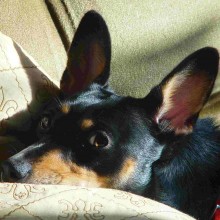Lancashire Heeler
Lifestyle Needs
 The Lancashire Heeler’s origins are not clear but it has been suggested that he is a mix of Welsh Corgi and Manchester Terrier. He is tough, intelligent, energetic and playful and needs plenty of opportunity for play and human interaction. He enjoys playing with children and can take moderate amount of rough and tumble. As his name suggests, when excited the Lancashire Heeler can nip at heals and has a tendency to want to be the pack leader. He needs up to an hour’s exercise each day but could adapt to a town or country lifestyle. Generally the Lancashire Heeler has a relatively long average lifespan of 13-14 years.
The Lancashire Heeler’s origins are not clear but it has been suggested that he is a mix of Welsh Corgi and Manchester Terrier. He is tough, intelligent, energetic and playful and needs plenty of opportunity for play and human interaction. He enjoys playing with children and can take moderate amount of rough and tumble. As his name suggests, when excited the Lancashire Heeler can nip at heals and has a tendency to want to be the pack leader. He needs up to an hour’s exercise each day but could adapt to a town or country lifestyle. Generally the Lancashire Heeler has a relatively long average lifespan of 13-14 years.
Genetic Diversity
(Known as Coefficient of Inbreeding: 'COI'. It should be as low as possible.)
The UK Kennel Club breed average COI is 3.5% - See 'A Beginners Guide to COI'
Gene Pool Size
(Known as Effective Population Size: 'EPS')
32.8
EPS is a measure of how many individuals are contributing genetically to a breed population. It is a measure of the size of the gene pool in a breed. Lower than 100 is considered critical by conservationists and below 50 brings a breed close to extinction. For more information see the Kennel Club article.
Health and Welfare Problems due to Conformation
(Body shape and physical characteristics)
None known
BVA/KC Health Schemes: www.bva.co.uk/chs
- Eye disease: Collie Eye Anomaly (CEA) (litter screening);Primary lens luxation (PLL) (annual testing) Persistent Pupillary Membrane (PPM) Hereditary Cataract (HC)
Estimated Breeding Values (EBVs) : No EBVs are currently available for this breed
www.thekennelclub.org.uk/about-ebvs
DNA Tests Available
DogWellNet and IPFD Harmonisation of Genetic Testing for Dogs (HGTD)
www.dogwellnet.com/breeds
- Collie Eye Anomaly (CEA/CH)
- Primary lens luxation (PLL)
Availability of a DNA test does not mean that it is always necessary or even desirable for breeders to use this test.
Other Breed-Specific Health Screening Schemes
None known
Ask the breeder to show you the certificates for the above tests/screening for both parents. If any of the above tests have not been considered necessary by the breeder (and there may be good reasons), ask her to explain why.
Other Diseases Reported
(For which there are currently no genetic or screening tests for sire or dam)
- Patella Luxation
Ask the breeder about the medical history of the parents, grandparents and great grandparents. Consider carefully whether to purchase a puppy if some of these or other diseases are in the family line.
Ask about the breeder’s policy in cases of serious genetic diseases occurring to your puppy in later life. Good breeders will request to be informed of such events in order to improve future breeding decisions.
You are strongly advised to buy from a breeder who uses (or is prepared to use) the AWF Puppy Contract and Puppy Information Pack (PIP): www.puppycontract.org.uk
The breeder should also be familiar with the CFSG/DBRG Code of Practice for Dog Breeding